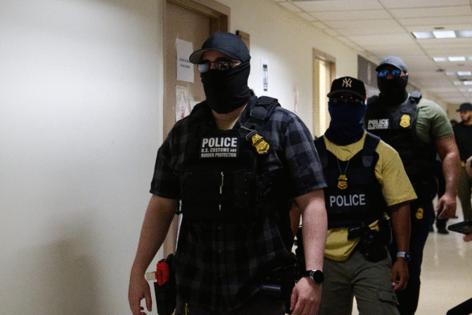Commentary: Police must rise to meet the moment
Published in Op Eds
I have been a close observer of American policing for most of my life. During my 30-year career in law enforcement, I served as a patrol officer, detective, trainer, and from 1972 to 1993 the chief of police in Madison, Wisconsin. I’ve seen brutality, courage and redemption in this line of work. But I have never seen a greater police-related threat to our democracy than what we are witnessing today.
That threat was recently made clear when the U.S. Department of Justice issued a stern warning to California officials who suggested that state or local officers could arrest federal immigration agents who violated California law. The message claimed that their actions amounted to an “apparent criminal conspiracy.” “ No one threatens our agents,” declared U.S. Deputy Attorney General Todd Blanche in late October. “No one will stop us from Making America Safe Again.”
Let me be clear: Local police should and will cooperate in helping ICE arrest those who have committed serious crimes since coming to this country. The line is not between cooperation and resistance; it is between lawful justice and unlawful harm.
The potential for a confrontation between federal authority and state sovereignty indicates a deepening crisis in how this nation balances police power and accountability.
Across the nation, federal immigration agents — often masked, unidentified and operating without judicial warrants — are entering cities to detain and deport undocumented residents under the false banner of pursuing “murderers, rapists and drug dealers.” These actions are political, reckless and corrosive to the public trust on which effective local policing depends.
A brief legal primer: Under federal law, crossing the border without inspection is a misdemeanor for a first offense, while re-entering after deportation is a felony. But most undocumented people are not criminals. They are supposed to be subject to civil immigration proceedings, not criminal prosecution. And those who come to our borders seeking asylum are doing what the law explicitly allows: requesting protection from persecution, a right recognized under both U.S. and international law.
Local police cannot legally stop federal agents from making arrests. But to protect the safety and rights of all people, they can — and must — refuse to participate in unlawful detentions and insist that federal officers identify themselves, take off their masks and act lawfully. Officers must document every encounter, report every misuse of force and intervene when life or safety is at risk. Above all, they must remember that their allegiance is to the Constitution, not to politics or politicians.
Most police departments now have a “duty to intervene” policy, which requires officers to step in if they witness another officer using excessive force that endangers a person’s life or violates the law. That duty applies even if the person using force is a federal agent. The core obligation remains: Protect life and prevent unlawful harm.
Whenever federal agents with U.S. Immigration and Customs Enforcement (ICE) or the Border Patrol operate in a community, local police must respond — not to assist in arrests, but to observe, document and ensure that lawful procedures are followed. Local officers should record the names of ICE agents, call for supervision and ask them to identify themselves, take down the names of those arrested so their families and legal advocates can locate them and serve as witnesses to protect both the process and the people.
This is not obstruction — it is oversight. It’s what democratic policing looks like when power must be accountable and human dignity protected.
We are facing an unprecedented moment in our nation’s history, one that pits the duty of local police to guard, serve and protect everyone in their community against a federal government making sweeping, politically driven arrests of immigrants. It is a moment for local police leaders to reclaim the moral center of policing. Their legitimacy does not come from weapons or badges — it comes from the trust and respect of those they serve. That trust and support from their community is destroyed when local officers stand silent while unaccountable federal agents operate in the shadows.
History will ask what we as a nation and its police force did when fear wore a badge and a mask. Let the record show: We, as a nation and as its police, showed up, stood up and said no.
_____
David Couper, a former chief of police turned Episcopal priest, is the author of the 2012 book, “Arrested Development: A Veteran Police Chief Sounds Off About Protest, Racism, Corruption and the Seven Steps Necessary to Improve Our Nation's Police.” and comments on policing at improvingpolice.blog. This column was produced for Progressive Perspectives, a project of The Progressive magazine, and distributed by Tribune News Service.
_____
©2025 Tribune Content Agency, LLC.
























































Comments